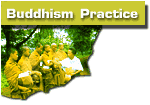GOING
FOR REFUGE
While
visiting or living at a Thai wat, you'll soon become familiar with
the Pali intonation of the Three Refuges.
Buddham saranam gacchami (I go to the Buddha for refuge)
Dhammam saranam gacchami (I go to the Dhamma for refuge)
Sangham saranam gacchami (I go to the Sangha for refuge)
In going for refuge, we seek safety and stability in
a changing and unpredictable world. We can reflect on
the meanings of each phrase, then use them to guide
our lives. When we take refuge in the Buddha, we have
faith both in the historical Gotama Buddha's enlightenment and
in his qualities of supreme wisdom and compassion that we can aspire
to. Refuge in the Dhamma, the ultimate truth or reality, invites
us to turn the mind to experience the here and now,
the way things are. Refuge in the Sangha refers to a
group of people which lives with high standards of conduct in bodily
action and speech; the group can refer to the "Awakened
Ones," the order of Buddhist monks, or all the people
who are following the Buddha's path to liberation. We take refuge
in the virtues of generosity, kindness, compassion, goodness, and
let go of those thoughts which lead to harm.
TAKING THE PRECEPTS
The Buddha's path to liberation begins from a foundation
of moral discipline (sila). Taking care of our actions
through restraint allows the mind to readily develop
concentration and wisdom. A basic moral discipline also
brings happiness, self-confidence, and self- respect.
Five precepts -- guidelines to good conduct --
can be undertaken by everyone: (1) Refraining from taking
life; (2) Refraining from taking what is not given;
(3) Refraining from sexual misconduct; (4) Refraining from
false or harmful speech; and (5) Refraining from intoxicants. As
with other teachings of the Buddha, the precepts invite
reflection, wisdom, and compassion in their application.
The precepts provide a standard of behavior that has
great power. Standing by the precepts prevents the harmful
actions and speech that might otherwise occur when strong
feelings of hate, greed, or sexual desire beset the mind.
Laypeople visiting a wat on wan phra (full-,
new-, and half-moon days) or anytime for meditation
may choose to observe 8 precepts; these include the
5 precepts (#3 changes to refraining from any sexual activity)
with (6) Refraining from eating solid food after mid-day;
(7) Refraining from dancing, singing, music and shows, garlands,
perfumes, cosmetics, and adornments; and (8) Refraining
from luxurious and high seats and beds. The 8 precepts
may at first appear difficult, but in a monastic environment
they help direct one's mind toward spiritual development.
HELPFUL
HINTS ON USING THE LISTINGS
Names and addresses have been written in Thai script
as well as English for this edition. [NOTE: the Thai
script is not available in the online edition] The Thai
will help convey your destination to bus, songtaew,
and taxi drivers. Many characters of the Thai alphabet have
no precise English equivalent; if you can read or have someone pronounce
the names in Thai, you'll know how to say them correctly.
Thailand has 76 provinces (jangwat), which are
divided into districts (amper or amphoe), and subdivided
into precincts (tambon or tambol). The word ban means
"village." If you see amper muang in an address, that
means it's in the capital district of that province (provinces
take the same name as their capital).
Many wats and meditation centres in Thailand
have telephones, but you're not likely to get someone who speaks
English; try to have a Thai friend call for you if you don't speak
Thai. Telephone area codes, in parentheses, are used
only if calling from another area code.
Some wats and centres, as noted in the
"Write in Advance?" section, prefer that you
write ahead with your plans to visit; but even if not required,
an advance letter will always be appreciated.
|

